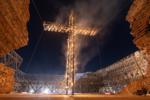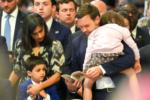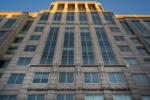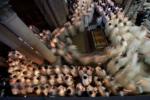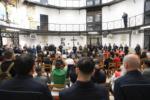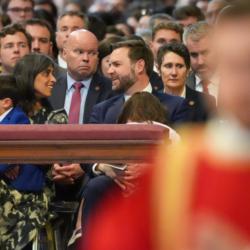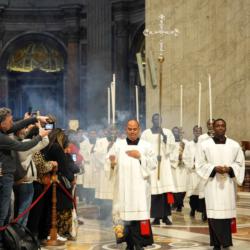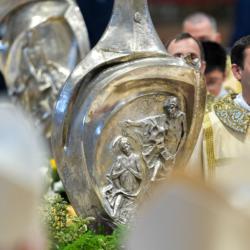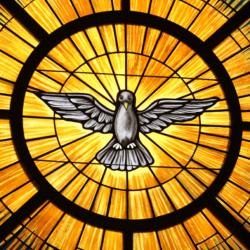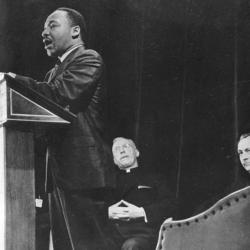Complexities of US immigration visa system impact the church's pastoral mission
(OSV News) -- America's tumultuous immigration system is again impacting nonordained religious workers from other countries -- including Catholic religious sisters and brothers.
When the EB-4 category -- Employment-Based Fourth Preference Special Immigrant Religious Worker Visa -- was extended to Sept. 30 as part of the continuing resolution that averted a federal government shutdown in mid-March, this was superficially good news.
The program was due to retire with the expiration of the previous Biden-era continuing resolution that reauthorized it. However, the EB-4 quota limits were quickly reached because of a significant backlog of waiting candidates. Now, the program is currently unavailable until the new fiscal year begins Oct. 1.
The EB-4 category is designated for those who don't readily fit typical immigration groups but also qualify for permanent residency. It includes not only religious workers, but also vulnerable immigrant minors.
When first enacted as part of the Immigration Act of 1990, this program was set to expire in three years. It has been continuously and periodically reauthorized since then. Over the years, the U.S. bishops and many others have called for a permanent legislative extension for the EB-4 category to provide relief to religious organizations and a measure of stability that would allow both religious organizations and federal agencies to plan ahead.
Which raises a legitimate question: Will this situation ever get sorted out in a way that satisfies both America's labyrinthine immigration system and the pastoral needs of the U.S. church?
"Religious workers, unfortunately, do not have many options to remain in the United States beyond the R-1 status time that they're granted," said Miguel Naranjo, director of religious immigration services for the Catholic Legal Immigration Network Inc., or CLINIC.
The R-1 is a temporary visa specifically designed for religious workers -- including ministers and those in religious vocations or occupations. But the holder is only allowed to remain in the U.S. for five years. Once that period expires, an individual must leave -- and cannot return for another year. The EB-4 visa grants permanent residency (known as a green card).
"And so the problem -- pretty much since 2023 -- that we've been facing is that religious workers are having to leave, because there's no way to stay," Naranjo continued. "The good news is, we have been able to have them return. So, after a religious worker has been outside the U.S. for one year, then they're eligible for a brand new (visa) period. So we've been bringing folks back -- and we're encouraged by that."
Still, a new American commander-in-chief -- especially one as focused on immigration issues as President Donald Trump -- has meant fresh immigration developments.
"Certainly a lot has changed in a very short period of time with respect to immigration since the new administration has taken over," admitted Naranjo, "and we have very serious concerns about how this is going to impact the religious worker program."
Both longer visa processing times and entry restrictions may be on the horizon, Naranjo said.
"One of the things we're concerned about -- even though we're not really yet seeing it -- is with the processing of immigration applications and petitions," he said. "Are the processing times going to increase substantially because of cuts to funding; cuts to federal employees that adjudicate these applications? That is the big concern."
"The other concern that we have is a potential executive order to deal with a travel ban -- that nationals from certain countries may be either prohibited from getting visas to enter the U.S., or prohibited entering the United States. And," added Naranjo, "we represent international religious workers from all over the world."
J. Kevin Appleby -- senior fellow for policy and communications at the Center for Migration Studies of New York and former director of Migration Policy and Public Affairs for the U.S. Conference of Catholic Bishops -- said congressional allies are the most likely officials to assist with future adjustments to the visa plight of religious workers.
"It might be an area where the bishops and this administration could perhaps afford to compromise, or make some headway -- but I think Congress will provide the most support in this area," commented Appleby.
"We had to reauthorize a portion of the program for several years," he said, speaking of his tenure at the USCCB, "and it always received bipartisan support. So I would hope that would be the case now. But without this program, the bishops would face quite a challenge filling some of the pastoral roles in their dioceses."
The current and future uncertainties of America's immigration system are genuinely disruptive to the church's efforts to serve not just its flock, but the broader community, according to Appleby.
"The church relies on religious orders -- on brothers and sisters -- to perform a wide range of functions," he continued, "including social services; staffing certain parishes; just the running of the pastoral machinery of the church."
David Spicer, assistant director of policy for the USCCB's Migration and Refugee Services, agreed that the specter of a complicated and seemingly inexact visa process can be off-putting.
"This makes some dioceses more reticent to participate in the religious worker visa program, even though they still have the same need for these workers," Spicer explained, "either because of the difficulty they have with native-born vocations, or because the cultural demographics of the diocese just necessitate having priests and other religious workers who are capable of ministering to those different cultural groups."
Spicer said the USCCB is eager for a legislative remedy.
As OSV News reported, the U.S. bishops on April 10 told congressional lawmakers they support bipartisan legislation to ease some immigration restrictions on religious workers from other countries, allowing them to stay in the U.S. while they wait for permanent residency.
Titled the Religious Workforce Protection Act, the legislation was introduced by Catholic members of the Senate and House -- Sens. Susan Collins, R-Maine, Tim Kaine, D-Va., and Jim Risch, R-Idaho, and Reps. Mike Carey, R-Ohio, and Richard Neal, D-Mass.
If it becomes law, it would permit religious workers already in the U.S. on temporary R-1 status with pending EB-4 applications to stay in the U.S. while waiting for permanent residency.
"We're really hopeful that Congress will collectively take up that bill," said Spicer, "and send that to the president's desk either as a stand-alone measure or as part of a larger legislative vehicle, such as an appropriations bill or something along those lines."
The responsibility, Spicer said, lies with the U.S. Congress.
"It falls on Congress to alter the visa category, and who qualifies or who relies on that visa category," said Spicer, referring to the EB-4. "So it was ultimately Congress -- back during the 90s -- that made the sort of inexplicable decision to include not only religious workers, but also special immigrant juveniles and several other classes of folks as well in this category."
The governmental accretions and interpretations of several decades have muddled the EB-4 program, originally created under the Immigration Act of 1990.
"We are hopeful," repeated Spicer, "that there is an adequate amount of bipartisan support to be able to get that program operating the way that it's supposed to be operating."
"And of course," he added, "for American communities across the country to be able to benefit from those religious workers in the way that they should be benefiting."
- - - Kimberley Heatherington writes for OSV News from Virginia.


